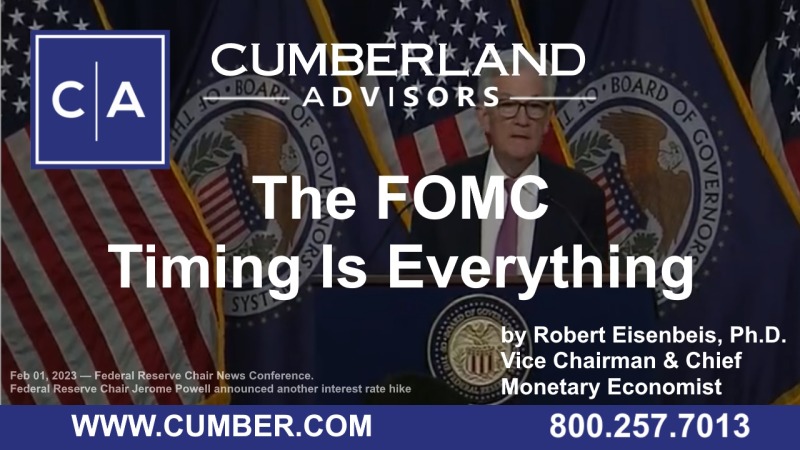The suggestion in last week’s FOMC minutes that a slight recession was a possibility later this year was widely publicized. The suggestion was initially reported as the FOMC’s view, but it was quickly corrected as having been contained in the staff’s forecast presented to the Committee. What likely led the staff to forecast a modest recession at the March meeting? Well, timing is everything, and we need to understand what was in play as the staff put together its material for the FOMC’s consideration.

The FOMC met on March 21 & 22. Just 10 days prior to that meeting, a series of events hit financial markets, beginning with the failure of Silicon Valley Bank on Friday, March 10, and of Signature Bank on March 12. These failures triggered strong reactions from Treasury, the Fed, FDIC, and OCC out of concern for financial stability. The government covered all deposits, insured and uninsured, at the two banks; and emergency lending programs were put in place to help prevent other banks from experiencing liquidity problems and to bolster confidence in the financial system. The Bank of England and UK Treasury facilitated the sale of a London-based subsidiary of HSBC. Only three days later, on March 15, Credit Suisse experienced a decline in its stock and was taken over by UBS on March 18.
This timeline of events, which raised questions of financial stability globally as well as in the US, clearly implied that US credit standards would be tightened and that this would put downward pressure on the economy as a whole. It seems logical that these events would be hard to ignore or to gloss over when it came to assessing the downward risks to growth. The easiest way for the staff to respond would be to build a slight recession into its forecast, at least for discussion purposes.
Interestingly, the FOMC participants’ SEP projections could be adjusted right up to the end of the meeting. It is noteworthy that the minutes make no mention of any participant’s suggesting that a recession was in his or her view of growth through the end of 2023. Everyone clearly saw that the risks to the downside had increased, and many of those who may have penciled in a 50-basis-point increase in the target rate at that meeting noted that financial conditions had tightened and suggested that only a 25-basis-point increase in rates would be appropriate.
Post the March meeting, there are as yet few signs of a recession. The Michigan Consumer Sentiment Index stood at 63.5 in April and was up slightly from 62% in March. The Wall Street Journal Economic Forecasting Survey saw a slight decrease in the probability of a recession, from 63% in October to 61% in both February (pre-crisis) and in April (post-crisis). Job growth has slowed, but labor markets remain tight. Job openings are now just below 10 million for the first time in months. The unemployment rate remains at 3.5%. As for inflation, while the most recent data suggest a continued decline, that is not likely to be the case when the April inflation numbers come out, because of OPEC’s cutback in oil production. Gasoline prices have increased in April, and in some instances are as much as 20 cents per gallon higher than at the end of March.
So, while there was a knee-jerk reaction to the mention of a recession in the FOMC minutes, reflecting the staff forecast, it is likely that that a recession might not have been featured had more recent data on the economy been available at the time the forecast was prepared.
Robert Eisenbeis, Ph.D.
Vice Chairman & Chief Monetary Economist
Email | Bio
Links to other websites or electronic media controlled or offered by Third-Parties (non-affiliates of Cumberland Advisors) are provided only as a reference and courtesy to our users. Cumberland Advisors has no control over such websites, does not recommend or endorse any opinions, ideas, products, information, or content of such sites, and makes no warranties as to the accuracy, completeness, reliability or suitability of their content. Cumberland Advisors hereby disclaims liability for any information, materials, products or services posted or offered at any of the Third-Party websites. The Third-Party may have a privacy and/or security policy different from that of Cumberland Advisors. Therefore, please refer to the specific privacy and security policies of the Third-Party when accessing their websites.
Cumberland Advisors Market Commentaries offer insights and analysis on upcoming, important economic issues that potentially impact global financial markets. Our team shares their thinking on global economic developments, market news and other factors that often influence investment opportunities and strategies.

